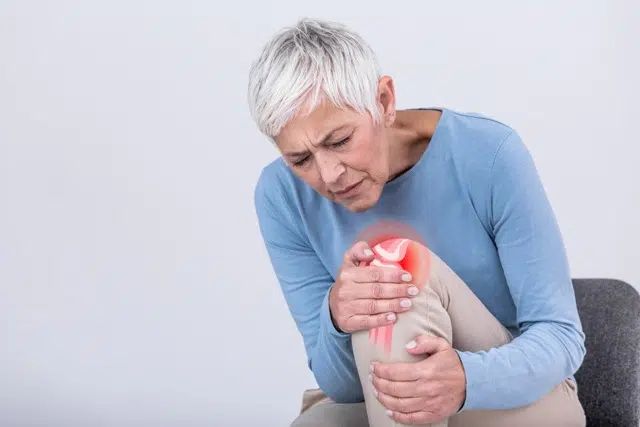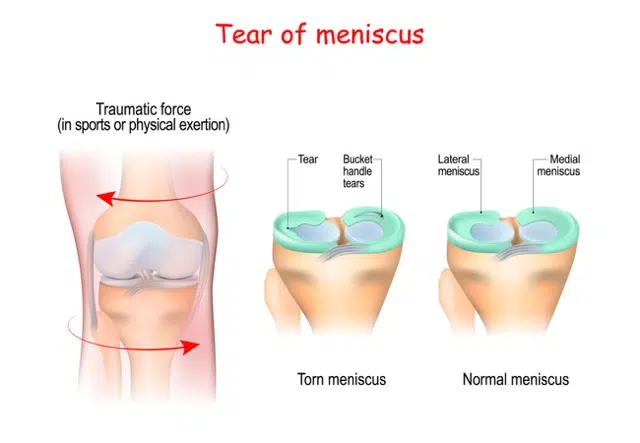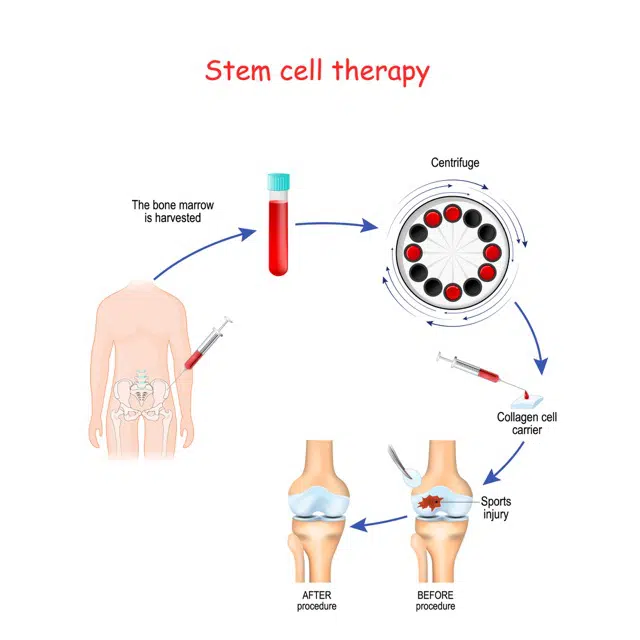
Inserted between the knee's shinbone and femur are pieces of tough cartilage called the menisci. Acting like powerful shock absorbers that reduce the impact of weight-bearing activities (walking, running), the menisci are prone to inflammation and tearing. Engaging in vigorous physical activity that involves abrupt twisting or turning of the knee is a frequent cause of meniscal tears. Older individuals with pre-existing knee problems often need meniscal tear treatment, especially if they have been diagnosed with a degenerative knee disorder.
Meniscal tears rarely heal completely on their own because of where the menisci are located. With menisci located in such a restricted area where blood supply is limited, torn meniscus treatment demands the proven restorative properties provided by regenerative medicine services at Houston Spine and Regenerative Medicine.
Although the menisci are tough, rubbery, pieces of soft tissue, they can tear if the knee is twisted or rotated forcefully enough while the foot is firmly on the ground. Over one million U.S. adults suffer one or more meniscus tears every year as a result of playing sports or simple aging. In most cases, meniscal tears do not require surgery unless the person affected delays receiving treatment for meniscal tear symptoms.
Tearing the meniscus means the tissue is unable to protect the knee from weight-bearing impacts. Consequently, the bones in the knee joint are scraping and rubbing against each other, similar to the way bones grind together in a joint affected by osteoarthritis. In fact, people with knee arthritis can experience a torn meniscus without engaging in rigorous physical activity.

Hearing a popping or cracking sound at the moment a meniscus is torn is often reported by patients who need meniscal tear treatment in the Woodlands. Other signs of a torn meniscus include:
Pain and swelling--these symptoms may not appear for a few days until inflammation starts spreading inside the knee joint.
Difficulty extending or bending the knee--as the meniscus tear worsens, it will become more painful to straighten or flex the affected knee
"Locked" knee--if treatment of meniscal tear is delayed, the torn piece of the meniscus can float away from its initial location and wedge in between knee joint bones.
Instability of the knee joint--walking with a meniscal tear may feel like your knee is going to give out or that the knee will suddenly fail to provide enough support to remain upright.

Meniscal tear symptoms such as pain, swelling, knee weakness, and hearing popping or grinding sound when you move your knee indicate you should schedule an appointment for torn meniscus treatment as soon as possible.
Tests used to diagnose a meniscal tear include:
Your physician will discuss the results of a physical exam and tests with you before recommending a treatment program.
Meniscal tear treatment in Houston involves regenerative medicine techniques that utilize the restorative ability of mesenchymal stem cells, Natural Tissue Matrix, and other components found in the body. Currently, three types of regenerative therapies are provided at Houston Spine and Regenerative Medicine to heal meniscal tears:
Stem Cell Therapy

When stem cells are injected into torn menisci, they replace damaged cells by dividing and developing into healthy versions of those cells. Sometimes called undifferentiated cells, stem cells are also used to treat spinal cord injuries, heart disease, cancer, severe burns, osteoarthritis, Parkinson's disease, and even type 1 diabetes.
Tissue Repair via Tissue Regeneration
This non-invasive treatment that is often done outpatient is one of the effective ways to treat a meniscus tear. They do this procedure by injecting a cocktail of building scaffolds that came from different resources into the damaged area. This triggers a signal to the sources that activate the repair, hence the regeneration.
CTM Implants
Connective Tissue Matrix is the process of building and regenerating torn or damaged tissues within the body.
CTM implants trigger this type of regeneration on the severely affected area of the meniscus by injecting a mix of compounds that consists of a variety of proteins, collagen, and glycoproteins.
With this treatment, the affected area of the meniscus triggers the natural connective tissue matrix therefore regeneration happens. This form of regenerative medical procedure is proven to have fewer complications and even manages chronic pain.
Houston Spine and Regenerative Medicine is a leading treatment clinic that specializes in regenerative therapies proven to reduce the need for surgery. Led by two of the top physicians from Houston, Dr. Jerry Gentry MD and Dr. Mark Yezak, we offer all new patients full diagnostic testing and a free consultation.
Don't let a painful meniscal tear continue reducing your quality of life. Call (281) 362-0006 (Woodlands office) or (713) 652-4052 (Houston office) to schedule an appointment for non-surgical meniscal tear treatment.
